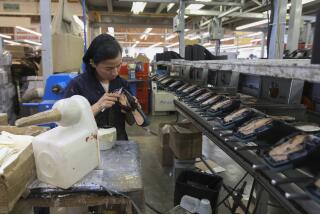Kantor Calls for Emergency Talks With Japanese : Commerce: The U.S. trade representative reacts to a report that Japan’s purchase of foreign semiconductors is below target.
- Share via
SAN FRANCISCO — Angered by a report that Japan’s purchase of foreign semiconductors has continued to slide to well below its 20%-of-market target, U.S. Trade Representative Mickey Kantor called Monday for emergency talks between the two nations next month.
“This latest share number raises serious concerns regarding Japan’s commitment to fully implement the Semiconductor Arrangement,” Kantor said in a statement issued in Washington. “We will seek to put in place a joint plan of action to improve dramatically foreign share and access to the Japanese semiconductor market.”
Semiconductors--the silicon chips that serve as the brains of personal computers, consumer electronics gear and other equipment--have for nearly a decade been a source of trade tension between Japan and the United States. The U.S. industry, much of it based in Silicon Valley, approached the brink of annihilation in the mid-1980s because of a competitive onslaught from Japanese electronics companies.
Two years ago, with the U.S. industry well on the road to recovery because of investments in sophisticated new products and Japan starting to feel the crunch of recession, the nations reached the U.S.-Japan Semiconductor Agreement.
Under pressure to reduce trade barriers and cut its hefty trade surplus--expected to reach $60 billion this year--Japan vowed to boost the foreign share of its semiconductor market to 20% in 1993.
Although the level reached 20.2% in the fourth quarter of 1992, it has slipped steadily since, to 19.6% in the first quarter of this year, 19.2% in the second and 18.1% in the third. To reach the 20% goal, other countries’ share of Japan’s market would have to surpass 22% in the fourth quarter.
That strikes U.S. semiconductor officials as unlikely.
“The situation is extremely serious,” said Andrew Procassini, president of the Semiconductor Industry Assn., a trade group in San Jose. “Every effort should be made to correct the current shortfall in Japan’s performance.”
A spokesman for the Japanese semiconductor industry expressed bafflement at the latest data, contending it does not fully reflect Japanese manufacturers’ efforts to use more foreign chips.
“Foreign semiconductors have become indispensable to the Japanese users and fully integrated into the Japanese industry,” said Hidehiko Yoshida, chairman of the Electronic Industries Assn. of Japan’s Users Committee of Foreign Semiconductors. “Japanese users are working very hard to offer new opportunities for foreign semiconductor suppliers.”
U.S. chip companies are selling record amounts in Japan, said Stanton Anderson, an attorney representing the Japanese semiconductor industry in Washington.
“Market share on a quarter-to-quarter basis tends to fluctuate,” Anderson said, adding that the Japanese market is growing faster than imports. Thus, he said, U.S. semiconductor exports to Japan are increasing even as they may be shrinking as a proportion of the growing market.
Yet industry analysts have said lately that the Japanese market for semiconductors, heavily dependent on a recession-battered consumer electronics sector, has been weak. In fact, Dataquest Inc., a research firm in San Jose, found in a recent preliminary report on worldwide semiconductor sales that U.S. manufacturers surpassed their Japanese counterparts in 1993 for the first time since 1985. The U.S. market share was 41.9%, compared to 41.4% for Japan.
Meanwhile, the onetime clear-cut rivalry between the two countries’ semiconductor industries is no longer so obvious. As part of their survival tactics in recent years, U.S. chip companies expanded alliances with Japanese and other producers. Intel, for example, has a venture with Sharp, and Advanced Micro Devices and Fujitsu have agreed to split the cost of a chip plant in Japan.
Bloomberg News Service contributed to this report.
More to Read
Inside the business of entertainment
The Wide Shot brings you news, analysis and insights on everything from streaming wars to production — and what it all means for the future.
You may occasionally receive promotional content from the Los Angeles Times.











